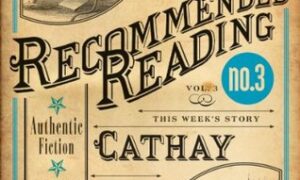 Bad Teeth by Dustin Long
Bad Teeth by Dustin Long
My rating: 3/5 cats



okay, i was really enjoying this the whole way through, but i was a bit let down by the ending.
it is a very self-conscious book, and very very funny. if you think omphaloskepsis is funny. and i happen to. it’s a cheeky story that takes place in four b-cities: brooklyn, bloomington, berkeley, and bakersfield, full of egotistical young adult hipster types who are struggling with relationships and self-discovery, solipsism and drugs and the dilemmas of translation, all overshadowed by a mysterious countercultural protest group whose philosophies are vague at best; changing the entire fabric of ideaspace ftlog, but who rally around an enigmatic and charismatic leader named viv la revolution under whose influence they will leave their mark in a big way. i mean, apparently.
Bad Teeth actually has a lot in common with Infinite Jest, both structurally and thematically. structurally it’s an easy scan—the story is told through a variety of different viewpoints, all revolving around a central character who is mythological in stature and far-reaching in influence but only briefly revealed on paper. there are connections between all of the characters; some known, some removed by a degree of separation, and their stories slide over each other through the device of an omniscient narrator whose identity is not revealed until partway through the narrative, as he asserts his own voice through the intrusion of footnotes. also—acronyms. also-also, this text has been written after a catastrophic event that is alluded to throughout, and the book is chronicling events leading up to this climax, this conclusion, which never actually happens within the story itself. add this to the fact that IJ is mentioned once explicitly and that jigme drolma, the mysterious author whose work is whispered about through all of these stories, is known as the Tibetan David Foster Wallace and baby, you got a stew going.

thematically, the similarities occur in characters who are incredibly lonely intellectual and pseudo-intellectual types, anesthetizing themselves with drugs and alcohol in order to avoid the vulnerability of relationships while still yearning for human contact and meaning. they are self-conscious and self-reflective; those very stoned or very immature young adult types who spend their time thinking about shit that seems so revelatory and clever at the time, like comparing the feelings of different kinds of love to the highs of different drugs, but are really just smug antisocial excuses for not taking action, and stalling their way through life.
At this point in his life, Judas was one of those vague young men on the verge of no longer being young, now in his midthirties, whose sense of purpose in life had been too long dependent on early promise, and who was only just beginning to realize that this promise had been rescinded; he was still defining himself in terms of what he might become rather than in terms of what he was, but he was beginning to learn.
yeah, like that.
but the text continuously pokes fun at these characters for their self-indulgences:
He went away feeling sorry for himself: seeing himself as Candide and wondering why he had even bothered moving here. But the reader shouldn’t feel too sorry for him, as he was ignoring all of the times in his life when he had been the one who had acted like a total dick to someone else. He tended to express his aggression more passively than Walter and his friends, of course, but at least they were open about who they were. Judas, on the other hand, pretended even to himself that he was sweet, romantic, and innocent when in fact he was just as competitive, lustful, and petty as any of them. Which is to say that he kind of deserved to have his finger broken.
which i think is fun.
and there are the same kind of dizzying monologues as in IJ:
“Yeah, well. It’s just that you get this one little piece of clout and they treat you as if you’re some sort of authority, and for a second you start to believe it, and so you end up coming across as all pontificatory, you know?…But then if you start worrying too much about that shit, it gets even worse. It becomes like this false modesty thing, where you’re like, ‘I have to pretend I’m not as great as everyone thinks I am, otherwise I’ll seem like I’m full of myself.’ But then that ends up being the real sign that you’ve bought into your own hype, when you feel like you have to hide it…You read my first story, so I know that you’re going to look at my new one in relation to that. You have expectations about who I am and how I write. And I can’t help that, I guess—I mean, there’s nothing I can really do about it—but I can’t let it bother me either. So yeah, you know, the new one is completely different from the first one. But then that’s a choice, too. I mean, do i deliver a known quantity and position myself as a niche writer, just doing this one thing well, over and over; or do I risk alienating my established audience by trying something new? It’s like, that question is always there, but it’s a question that you can’t let yourself worry about. Or it’s a decision that you have to make without worrying about all of the repercussions, at least with regard to that particular question. I mean, you have to make the decision for entirely separate reasons.
which the leads into this “oh no you didn’t” punchline
“If I actually have to summarize it in a single sentence, I guess I’ll say that it’s about Ludwig Wittgenstein lacking the words to express his love for a young Cambridge mathematician. But that makes it sound pretentious, you know, when for me—even though it’s about a language philosopher—it’s not really about language or philosophy; it’s about the emotional core. I mean, to be totally honest, even though I obviously don’t expect anyone to get this, for me it’s about my twin brother, Isaac.”
and the former english major undergrad in me stifles a snort of recognition. which is repeated every time the words “objective correlative” are used. which is *spoiler alert* a lot.
there are also a lot of jabs taken at interpretation—of books and films within the book, dreams, diary entries and unsent letters, student stories, all of which are very revealing and also a hoot. and some really funny parts about the woes of academia in the clash of wealthy-and-disgruntled parents vs. university faculty.
but there are also less funny passages about the inherent loneliness to the act of both reading and writing, and the chasm of communication which occurs between people who are too self-involved:
The conversation was awkward. They both had things to say to the other, but they had trouble with the diction. Caissa was halfway annoyed that she even had to deal with her own uncertain emotions when she would have preferred to put all of this energy into her book. Judas, meanwhile, was focused in wondering whether he would be able to engineer some other opportunity to sleep with her and thus cement what he hoped might become a real and meaningful relationship, though he couldn’t think of anything that wouldn’t come off as desperate. So, instead, they spoke mostly of other people…
or too woefully analytical:
Part of Adam suspected that his suspicion that he might be an alcoholic was just a way of trying to make himself seem more interesting: that telling Judas about it was a misguided attempt to sound mysterious and cool. But another part of him suspected that this skeptical analysis of the situation was just the alcoholism’s way of trying to hide itself.
or too defeated:
…he found that his ambitions had diminished in other areas, as well. Where he’d once dreamt of finding his one great love, now his thoughts on that subject didn’t reach beyond getting back to Brooklyn and having sex with Caissa again—or for Caissa to love him, and tell him that she loved him, even if they didn’t end up together forever. And beyond all of this, he wasn’t sure what any of his next goals should be—what he would have in his life immediately worth living for.
but okay, enough quoting, sheesh.
i really enjoyed this, and it was a four-star cat from the outset, but i found the ending to be very abrupt and jarring, which disappointed me into a half-star cat demotion. later today, i am going to reread/skim the book to see if i missed something that justifies this abruptness, but for now, i am going to say 3.5.
nope! i reread the whole thing, and i still feel a little blindsided by the whole ending-thing. however, and i know i said no more quotes, but i came across another passage i liked for its last-line ball-punch, so i leave you with:
But here it is, my big idea: the loss of a loved one is always pretty much the same. Or, that’s not the realization, but it’s sort of a corollary of the realization. But regardless of whether the reason you lose someone is because your love is unrequited, she leaves you for a neighborhood, or just because the person dies—and whether you’re talking about a parent, a lover, or a friend—they’re all sort of the same. The particulars allow for some shading of intensity, it’s true, but the worst part is always the same. You feel as if you can’t possibly get along without the person—and in a way you’re right; the person you are at the moment that you think this is more or less defined by the attachment you have—but the hardpan truth of it is that time will make you into someone else, someone who can get along without that person, no matter how much you don’t want it to. So the really traumatic thing is all nine instances—multiplying the three types of failure by the three types of relationships, though I don’t mean to say that’s the extent of the possibilities—isn’t the loss of the other person; it’s the loss of yourself. And it seems like the end of the world because it is—but only this world. The pain you feel—the pain that wakes you nauseated by your own gut-doubling sobs—it’s the pain of birthing someone into another world. Someone other than you who couldn’t exist without that love. So, you know, for what it’s worth: happy birthday.
read my book reviews on goodreads







